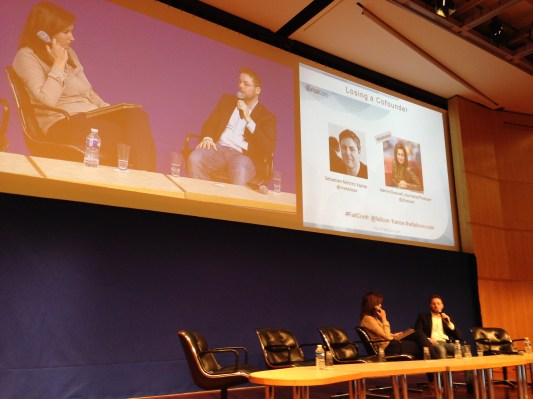Sébastien Métrot shared a tough story today at FailCon France at the Ministry for the Economy and Finance — he co-founded Yasound in 2011 with CEO Jean-Marc Plueger, who died in a scooter accident in 2012. But It wasn’t just an accident, Métrot said Plueger’s terrible work/life balance was a contributing factor. Today’s interview was Métrot’s tribute to his departed co-founder.
“What brought him to the accident is that he lost sight of his work/life balance. He lost track of what was right for his health, what was right for his life,” Métrot said. “Doing a startup like this is not passion anymore, it’s obsession. From what I gathered after his death, he was sleeping two or three hours a night. There is no way you can live a life like that.”
In sharing this story, Métrot wanted to warn entrepreneurs in the room that you have to keep your friends, you have to pay attention to your family. Or, as he put it, “you have to have a life outside of your company.”
“When you’re an entrepreneur, the work pressure is very different. You want to personally succeed and bring your dream to life — and it can push you way too hard. Knowing my co-founder, he was really passionate about the project. He wanted the company to succeed so badly.”
When your co-founder and CEO has an accident, there are some personal implications as well as professional problems. “I’ve been fortunate with my family, and my investors as well. On the mental health side, we got all the help we needed. We had seven employees and nobody left. Everybody stayed until the end, and that’s very important.”
Since then, the company shut down. “Without your co-founder, you have to learn overnight to take care of everything,” Métrot said. “There are also many legal issues. Who has to take care of the company? What do we have to do on the inheritance side?”
“There were some technical points in the way we structured the company that made the process harder. When you start a company, you’re supposed to subscribe to key man insurance for the main managers of the company. That was our biggest failure. We weren’t able to get new money for the company, we weren’t able to sell the company.”
Métrot stated that the company didn’t even consider this outcome. The team overlooked this aspect and it shouldn’t have. Investors Jaïna Capital and Kima Ventures later added requirements in their term sheets when it comes to key man insurance.
This is when the company realized that Yasound couldn’t continue without Plueger. “I couldn’t abandon the team, because the team didn’t abandon me. I helped them find new jobs, I mostly succeeded there. I had to go through the shutdown process — it took me eight months.”
You can never be prepared to deal with a tragedy. All you can do is act like a human — and that’s exactly what Métrot did. “I never thought about the money side during this experience. I learned so many things from this experience, and I never thought about the money.”
